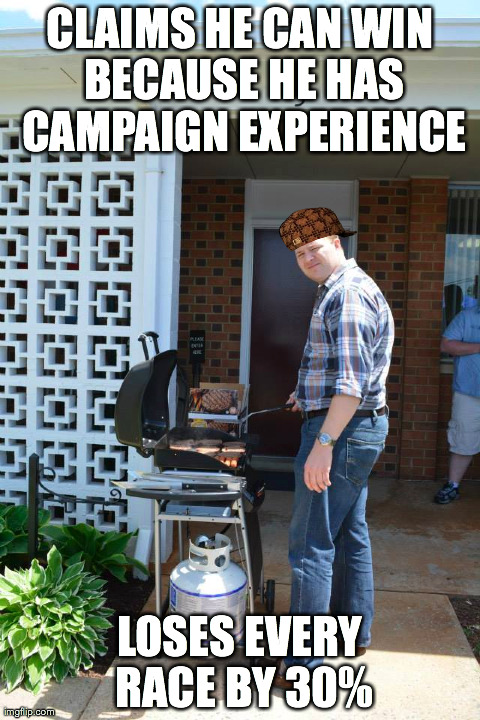Lynchburg City Council Recap Breakdown
If you want to wade through the numbers and what they mean, feel free to read the analysis below the numbered takeaway items.
*Disclaimer* There's a lot of it. It references a lot of numbers. It gets kind of into the weeds. If you stick it out, you'll have a good idea of what was happening, have some theories as to why, and understand probably more than you ever wanted to about how political campaigns actually work.
1. Campaign efficiency is important
Anderson's votes and resulting efficiency wasn't merely being drug along by the other 2 Republicans. Cary and Nelson both reduced their $/vote expenditure by over $2/vote from 2010, while Smith spent over 3x/vote as Cary, and nearly 9x/vote as Anderson in 2014. The more efficient you are, the further your resources go. This is often the difference in winning and losing.
2. Base turnout is important
The GOP had it's base turnout drop by 47% over the previous cycle while the voter turnout only dropped by 25%. Decide for yourself why that would've happened, but these races get started in December and January - plenty of time to hit every door of every person who voted in the previous cycle for city council… TWICE. (Seriously, we're talking 5 months here - I ran the race that knocked off Bev Sherwood last June in 5 WEEKS > if knocking off a 20 yr incumbent that has a 3-1 money advantage is doable in 5 weeks with like 8 volunteers - yes, EIGHT volunteers, turning out the GOP base in 8 weeks with 20-30 volunteers should be easily doable)
3. Numbers don't lie
It's one thing to talk a good game, it's another thing to actually perform. Politics isn't complicated when it comes to campaigns. Don't say anything stupid. Begin with the end in mind. Maximize your efficiency and effectiveness (which usually go hand in hand). Know where your advantages are compared to your opponents (technological and otherwise). Get your logistics squared away to do just that. If someone claims to be great based on X, Y, and Z, but then fails miserably, perhaps they're taking credit for someone else's work. Campaigns are empirical. Results are repeatable. People who legitimately know what they're doing will have repeatable, successful results - just like in business and in sports.
4. Excuses are for losers
You can make excuses and blame others or you can learn, get better, and be successful. You can't do both. Did you win? If not, then either figure out what you need to change and do it in the future, or shut your pie hole and stop whining.
5. Sometimes preconceived ideas fail miserably and spectacularly.
Its one thing to try new things. It's another to be dumb enough to not figure out why they were spectacular failures, in which case, you deserve to repeat them. Repeatedly parroting failed ideas as if they are the gospel truth is the best way to continue failing.
*Case In Point: Manning every precinct in a district doesn't = success, or necessarily even a respectable result. Last June I had enough volunteers to man 5 precincts out of 22. At 130pm we were losing. I pulled every volunteer but 1. We ended up winning. What did I have them do that pulled victory out of a losing situation? Here's a hint: It didn't involve having volunteers standing at the polls, waving signs, or posting pictures on Facebook that let the opponent know what you're up to.
*
6. Winning elections isn't about any individual
It's not about taking pictures, rubbing elbows with every politician you come in touch with, gaining fame, dressing up for fancy meetings and dinners, or trying to advance your way up a ladder to gain personal prestige. It's about winning, getting good people elected, and helping effect lasting positive change. The best campaign operatives are the ones who stand in the back, who you never see in pictures, don't particularly care about personal recognition, and would prefer to see their candidate's name in the paper as opposed to their own.
---------
The Numbers & Analysis

money spent as of 4/25 according to VPAP
http://www.vpap.org/offices/profile/311 ... on_id=6544
The issue here is partially the base turnout. The bottom 3 candidates were the ones receiving the Republican nominations, and the top 3 were the ones receiving the Democratic nominations. There is another part of the equation that is campaign operation and efficient use of resources. Many times lower funded candidates will spend less per vote and still lose. Yes, it happens. Dollar amount per vote efficiency is not the end all, be all of campaigns, but it IS a solid indicator of how well a campaign is run in comparison to the others, and a $/Vote number that is way out of line with other candidates - especially if the candidate doesn't win - is an indicator of a campaign that could've been run better in order to get a better result.
The 2014 results may simply look like the Dems got their base out and the Reps didn't, but taken in context with the 2010 results, and the fact that the GOP routinely wins the city in state and national elections with 60-70% of the vote and you have a much larger issue. 2014 appears to be a complete and total failure in identifying and turning out the Republican base.
(See comparisons between 2010 & 2014 turnout, both for the 3 candidates in both elections, as well as the baseline votes for the 2010 & 2014)
Comparison with 2010 at-large races
 http://www.vpap.org/offices/profile/311 ... on_id=6289
http://www.vpap.org/offices/profile/311 ... on_id=6289
While the baseline of votes to win dropped by 25%, Cary and
the GOP's base turnout plunged by 47%!!! Figure out who you want to blame for that. Is it the local party? Is it the candidates and their campaigns? H. Cary found a way to decrease his $/Vote by over $2 per vote from 2010. That at least was headed the right direction. He didn't have nearly as much money in 2014 as in 2010, but his campaign was certainly doing some things right.
To make matters worse for the GOP, given Anderson's paltry spending per vote, you can't even necessarily chalk his success up to merely running with an R endorsement. Why? Because he got out there and had his own base that voted for him, but didn't necessarily vote for the other two Republicans. Case in point (embarrassingly for the College Republicans), LU's precinct where Anderson went +54 over the other two Republicans!!!

(edited: sorry, this is the correct info for the LU precinct)
To make matters worse, Anderson won Ward 3 - arguably the most conservative in the city - vs the other 2 Republicans extending his lead over Cary (+57) and only losing a few votes to Smith (+38). Anderson was doing something correctly - and won 3 of the 5 precincts in Ward 3 - with considerably less money, the other two were clearly not keeping pace.
Anderson 813, Cary 756, Smith 775.
See a precinct by precinct breakdown here:
http://electionresults.virginia.gov/res ... 80&osn=021
Further, Anderson solidly beat the other 2 Republicans in Ward 2 (perhaps not surprisingly - although Smith has worked very hard in Ward 2 for at least 2 years dating back to the 2011 races). Anderson solidly won the 2 downtown precincts, not surprisingly in my opinion, but for him to beat Cary (+84) and beat Smith (+103) there, especially given Smith's hard work and connections down there IS a bit surprising. You would've thought that if anything, Smith would've beaten Cary there.
So clearly, Anderson wasn't just dragged along by the tide of the other two candidates. He had his own constituency that didn't vote for the other two. That then begs the question of, what was he doing with his much smaller pile of resources that the other two Republican candidates weren't doing? As an incumbent, Cary had the benefit of name recognition. Smith had the benefit of being by far the highest Republican fundraiser, and yet he finished second in Ward 3 and only barely beat Cary there by 19 votes. That with the Ward 2 results, results in a dead even split for the Smith and Cary campaigns headed into Wards 1 & 4 (two also very conservative Wards). It was there that Cary won by 88 votes, despite a severe resource disadvantage, and even beat Smith in Smith's home precinct - the strongest conservative turnout precinct in the entire city (102) which Cary lost by nearly 200 votes to Foster and 130 votes to Nelson, and Smith lost by just over 200 to Foster and 160 to Nelson. In short, the Republicans lost places they should've won, and didn't win nearly big enough in places they should've padded their margins. IMO, near systematic voter turnout failure (see numbers above re: 47% drop in turnout).








 - By Humble_Opinion
- By Humble_Opinion - By LU Armchair coach
- By LU Armchair coach